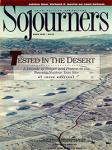The past few months have given us a vivid reminder of the power of violence -- the power to destroy, the power to kill. The Persian Gulf war and its chaotic aftermath stand as a graphic argument for nonviolence and diplomacy, as we see more and more evidence that violence is incapable of solving human problems, especially the cataclysmic violence of modern warfare.
The Gulf war was not, as some have asserted, an example of the failure of nonviolence. Rather, as has so often been the case in human history, nonviolence was abandoned before given a real chance. One reason people are so quick to forsake nonviolence is simply ignorance.
Activist and Jesuit priest John Dear goes a long way to dispel that ignorance in his book Our God is Nonviolent, an introduction to the theory and practice of nonviolence. While not breaking new ground, Dear provides an excellent overview of the theology of nonviolence in a compelling and readable manner. He draws on some of the best theoreticians and practitioners of nonviolence, from historical heroes to contemporary interpreters.
The emphasis throughout is on the theology of nonviolence, and not just its politics or practice. Nonviolence, Dear explains, can never be reduced to tactics only. True nonviolence requires a revolution of the heart, a conversion. The author rightly grounds such an inner, spiritual experience where it belongs: in the life, teachings, and -- most important -- the Spirit of Jesus.
DEAR'S PRIME theological insight is reflected in the book title, and is based on a simple but profound truth. Jesus, God's son, not only teaches us how to behave as humans, but more important is the clearest expression of who God is. Jesus' way of nonviolence is an ethic for his followers. As the personification of God, Jesus also stands as a lived revelation of God's very nature.
The ramifications of this understanding are many, but one fundamental lesson to be drawn is that nonviolence is not an option but a central requirement of our faith. Living a nonviolent life, as Dear teaches, necessitates spiritual discipline -- because human nature, unlike God's, is not naturally inclined toward doing the right thing. "The spirit is willing but the flesh is weak."
The nonviolence theory of Our God is explicitly situated in the context of the nuclear-armed world of the 1990s. Nuclear weapons, as the author explains, have not disappeared despite the lack of public attention since the disintegration of the Cold War. Resistance to nuclear weapons serves as a case study for Dear as he looks at contemporary applications of nonviolence.
But such action is only a starting point. Gandhi taught that nonviolence cannot be preached, it must be practiced. And the evidence of a genuine conversion to nonviolence is found in the authenticity of one's life. In that spirit, the heart of the book consists of stories of people who have lived the way of nonviolence -- hence the book's subtitle. The individuals chosen are familiar ones -- Jesus and Gandhi, Martin King and Dorothy Day, Thomas Merton and Daniel Berrigan -- and Dear uses their exemplary lives to illustrate basic tenets of nonviolence.
The life and writings of Dorothy Day, co-founder of the Catholic Worker movement, are used to illustrate the insight that authentic nonviolence will lead to a deeper and deeper solidarity with the poor, including in Day's case a life of voluntary poverty. Merton's story, among others, demonstrates that the pursuit of nonviolence will drive one to embrace God more deeply through contemplative prayer even as we are more intimately connected with the world's suffering. And so on. Each mini-biography fleshes out the meaning of nonviolence for our world and, especially, for each of us.
Nonviolence, like John Dear's book, contains a spring of transformation that begins within one's heart and flows to the world. The converting power of nonviolence is seen first in the practitioner, and then perhaps in the opponent, in an unjust situation, or in the world.
The language of nonviolence is a foreign one in our violent culture. Perhaps if this foreign language were a required one, the whole world would learn to sing a new song. John Dear has laid out for us the notes. It's up to us to be the singers.
Jim Rice is editor of Sojourners.
Our God is Nonviolent: Witnesses in the Struggle for Peace and Justice. By John Dear, S.J. Pilgrim Press, 1990. $10.95 (paper).

Got something to say about what you're reading? We value your feedback!